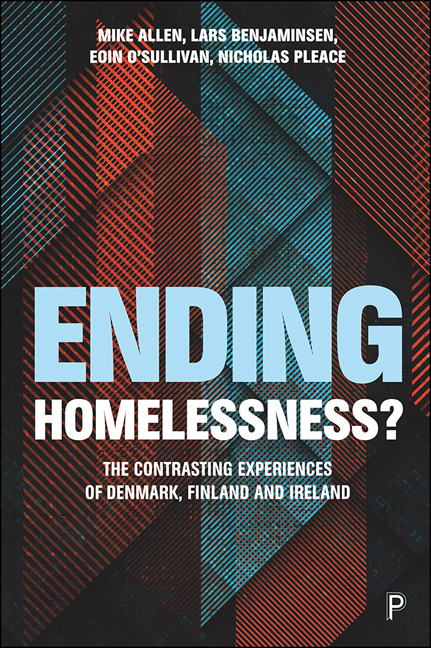Book contents
- Frontmatter
- Contents
- List of Figures and Tables
- Acknowledgements
- 1 Ending Homelessness? Policy and Progress in Denmark, Finland and Ireland
- 2 Before the Goal of ‘Ending Homelessness’: the Evolution of Policy
- 3 The Strategies Described
- 4 Trends in Homelessness in Denmark, Finland and Ireland
- 5 Explanations: Housing Matters
- 6 Explanations: Welfare and Politics Matter
- 7 Conclusion
- References
- Index
6 - Explanations: Welfare and Politics Matter
Published online by Cambridge University Press: 25 February 2021
- Frontmatter
- Contents
- List of Figures and Tables
- Acknowledgements
- 1 Ending Homelessness? Policy and Progress in Denmark, Finland and Ireland
- 2 Before the Goal of ‘Ending Homelessness’: the Evolution of Policy
- 3 The Strategies Described
- 4 Trends in Homelessness in Denmark, Finland and Ireland
- 5 Explanations: Housing Matters
- 6 Explanations: Welfare and Politics Matter
- 7 Conclusion
- References
- Index
Summary
Introduction
Having explored the role of housing in explaining the variable outcomes in the three countries under review, in this chapter, we turn to assessing the role of welfare provision in shaping trends in homelessness. Finland and Denmark are unambiguously part of the social-democratic welfare family, having high levels of decommodification for health and welfare services, with Ireland fitting somewhat uneasily, particularly in relation to housing, into the liberal cluster of welfare regimes (Esping-Anderson, 1990). In addition to housing-related factors, systemic factors related to welfare reforms have likely affected current trends in homelessness. Welfare benefits have generally been under reform in many countries following trends towards labour market activation for unemployed people and both the containment and the reduction of spending on social protection. This combination of growing shortages of affordable housing and reductions in welfare benefits has contributed to the housing exclusion of vulnerable groups.
The welfare state and homelessness in Denmark
Denmark has one of the most extensive welfare systems in the world, with a high level of income redistribution, universal health care, extensive social services and the provision of social housing. Wider social and housing policy probably helps explain why homelessness levels in Denmark are relatively low in international comparisons, with Denmark also possessing a significant and comparatively well-funded homelessness services sector. It also explains why homelessness is widely concentrated in people with complex support needs who fall through this otherwise extensive welfare safety net (Benjaminsen and Andrade, 2015). In particular, the scale of the public housing sector, in combination with relatively generous welfare benefits for families with dependent children, probably explains why family homelessness has remained at very modest levels in Denmark compared to many other countries, and to Ireland in particular (Baptista et al, 2017).
Although Denmark has largely avoided the austerity measures experienced by many other countries after the financial crisis, welfare reforms aimed at strengthening the financial sustainability of the system have been pursued, including ‘workfare’/labour market activationoriented reforms, mirroring wider trends in the economically developed world.
- Type
- Chapter
- Information
- Ending Homelessness?The Contrasting Experiences of Denmark, Finland and Ireland, pp. 139 - 158Publisher: Bristol University PressPrint publication year: 2020



